
Features
Community
Event reports
Changing for opportunities
Victor Day, Regional Auto Glass, Simcoe, Ontario
May 11, 2008 By Chris Skalkos
Victor Day, Regional Auto Glass in Simcoe, Ontario.
 |
| Victor ‘Butch’ Day is the owner of Regional Auto Glass in Simcoe, Ontario. |
After more than 40 years in the automotive glass industry, Victor ‘Butch’ Day has seen enough changes to know that the only thing constant in this business is change itself. As the owner of Regional Auto Glass in Simcoe, Ontario, he has grown his business based on the philosophy that diversification in the face of change is the key to success, and he has been diversifying his business ever since.
Day got his start in this industry by chance while working at a Canadian Tire store in 1968. “I was putting winter tires on for a customer who said that he liked the way I worked and offered me a job for higher wages,” he recalls. That job took him to a Standard Auto Glass replacement shop where he worked his way through the company from installer to store manager until 1985 when he decided that he wanted to go into business by himself.
The decision was not without risk. With a mortgage and three children to support, leaving a secure job for the unknown was not easy, but he says it was a move he needed to make. “I didn’t want to view this business strictly as production, this business is about looking after people,” he says.
With this in mind, he set out on his new venture by purchasing the building at his current location which was
actually a retrofitted barn heated by 20 electric baseboard heaters. “We had to replace the bearings on the hydro meter,” jokes Day about the hydro bills. The building was gutted and slowly rebuilt to accommodate his new autoglass shop operated by himself and two employees.
 |
| Like travelling billboards, the company vehicles are decked out to show off many of the aftermarket pickup truck accessories the company offers. |
Previous to Day opening Regional Auto Glass, Standard Auto Glass was the only shop servicing Simcoe, a small community of approximately 16,000 people in southwestern Ontario, near Lake Erie, which put him in the unique position of competing against his previous employer. “If we wanted to compete against Standard, we knew we had to do what they did better than they did,” he says, adding that the company’s automotive glass replacement and upholstery work took off based on its reputation for quality.
But Day knew there was more potential in this industry than just replacing broken windshields and he quickly set out to carve his own niche market servicing industrial and commercial customers with specialty glass for construction machinery, such as the glass in the cabs of bulldozers and overhead cranes. “These companies have hundreds of pieces of equipment on site that require service work. We dedicate two to three days per week servicing these customers,” he says, adding that this has also led to contract fleet work for commercial trucking companies.
While his business was growing so was Day’s workload and he soon found that he could not divide his time between all the different aspects of his growing business. “In a small business like this, one person can only do so much. I couldn’t be behind the counter and doing service work while sourcing all of the specialty glass we required while trying to maintain the quality of service we provide,” he explains.
 |
|
| Mike Brady joined the company in 2004 and is the shop manager. |
In 2004, he made an investment in his business by hiring employee Mike Brady as a store manager to free more time for Day to develop new business. This had an immediate impact on the company which quickly grew from three to six employees.
Brady, who has a background in plant engineering, was a customer of Regional Auto Glass but did not have any direct experience in the windshield replacement industry when he joined the company and recalls the ‘culture shock’ he went through adjusting. “I joked that if I was offered my old job back I would be gone. I never worked in retail and coming from a manufacturing background I was used to working with the same people every day, but now I see personalities coming through the door that I never knew existed,” he says. “I was overwhelmed at first. About 30 people come to the shop every day. It wasn’t at all what I expected. I thought it would be easy to jump in but it took about a year to get used to it,” he explains.
There was a special motive for Day to hire a newcomer to the industry rather than recruit from within and he
intentionally set out to hire someone who was young and in-tune with the latest technologies in the automotive industry. Brady who has experience in the drag racing and show car circuits as a family hobby for several years fit the criteria.
Says Day, “I’m in my late 50s, he is in his early 30s so he represents the next generation. I didn’t want to start
learning about the new electronics. I wanted to stay old school. So if somebody comes in that has been a customer for 10 years they call me, if a new customer comes in asking for new electronics I call Mike,” he says. “I needed a manager that I could be confident was looking after the shop while I am out seeing customers.”
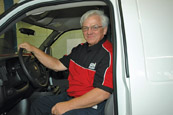 |
| Retired but active, Brady’s father Mike also works at the shop three days a week. |
One of the first things Brady did was computerize the company’s operations. “It’s important for small independent shops to use this technology,” says Brady. “We do a lot of business by e-mail such as purchase orders and quotes and through our web site where customers can see our catalogue of products, promotions and price list. Keeping up with the technological changes is a big part of this business. It allows us to work smarter, not harder, and do more with less,” he says.
With Brady on-board the company changed again, diversifying into other areas that complemented the autoglass work such as Krown Body Maintenance, an autobody maintenance and rust control division, as well as a wide range of aftermarket automotive accessories that include Leer truck caps, tonneau covers, step bars, grill guards, head racks and GPS units.
Day says that being diverse means quickly picking up on a product trend and capitalizing on it fast enough to take advantage of the market while it is still hot, even if it does not seem like an obvious fit. “I keep my eyes open and sometimes I see a product and think, there’s a market for that.” For example, Day started selling a line of small emergency generators after a customer requested it and he even sold mini-bikes right out front of his store. “The mini-bikes were only popular for one summer. Some things are trendy for a short time, a flash in the pan, so you have to be careful not to overstock. Get them in and sell them fast before the fad fades away,” he explains, adding that sometimes things do not work until they are tested.
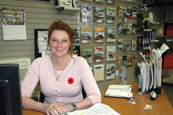 |
| Sherrie Bailey does administration work and is the first point of contact for the company. |
For example, automatic ignition starters seemed like an ideal product, but they require more of an investment in training and they took a long time to install. “The profit wasn’t there,” he says. The company even experimented with the flat glass and residential glass market. “These are two very different businesses. We got good product lines and we tried it to see if it works with what we do here. In business you can’t be afraid to test the market and give it a good honest effort.”
Part of the company’s marketing effort is its building and Day believes first impressions count. This is why he has put a great emphasis on the design of his showroom. While most autoglass shops have nothing more than a waiting area for customers, Regional Auto Glass boasts a large showroom where many of the company’s aftermarket accessories are displayed. Day explains that he is constantly changing it by adding new products and re-arranging existing ones. “This helps impulse buying. A customer comes in looking for a truck cover, I can show them a whole product line. Often they see something else they want but didn’t know we carry. The biggest challenge is letting people know we carry these products,” he says.
Another not-so-subtle advertising method is to use as many of the aftermarket accessories on its own service trucks. The two vehicles are well lettered and fully accessorized with the same products the company sells. “Our truck is a moving billboard. It’s the biggest marketing tool we have because it’s like showing off the finished product,” adds Brady.
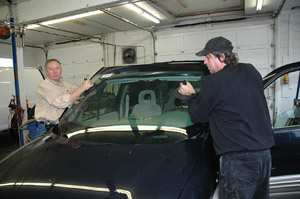
|
| Autoglass technician Dave DeVrye (right) and Victor Day replace a windshield on a customer’s car. |
Throughout the years, one of the biggest changes in the autoglass industry occurred in 2005 when Belron purchased the Canadian glass operations of Autostock International, a division of TCG International, that effectively gave Belron control of all Speedy Glass, Apple Auto Glass, Standard AutoGlass and Novus Repair and Replacement shops in the country. It also placed Belron as the dominant supplier to the autoglass industry controlling Autostock Distribution, Technicentre Plus and Vanfax.
Many of the independent shops in eastern Canada complained that they were buying products from Belron’s
distributors for much more than what Belron was selling the same products for to its own shops, putting independent companies at a disadvantage. However, the independents were more concerned about the part of the acquisition that gave Belron ownership of 1st Report Claims Services, a claims management service provided to insurance companies which gives Belron a monopoly in provinces where private insurance companies reign. Independents complained that prior to this they competed equally with other shops for the insurance work, but this has significantly diminished as independents claim that Belron is funneling insurance claims to its own shops through its own call centre.
“Sure it affected my business, I saw my insurance work drop off drastically, but it’s over my head and there is
nothing I can do about it so I go after the markets that are not being serviced,” says Day. “I’ll never forget a seminar I attended where I sat around with 20 old glass guys whining about how bad the industry is, but we are not going to cry about it. It’s out of our control so we decided to move on, but in a different direction. I decided that diversification was the key for survival, so I looked at the high performance aftermarket that was growing and I knew it would make a nice fit. I can’t see how independents can do it without diversifying into other areas.”
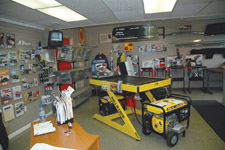 |
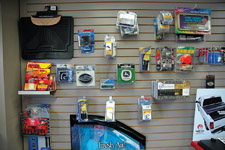 |
| Regional Auto Glass boasts a large showroom where many of the company’s aftermarket accessories are displayed. | |
Another measure the company has taken is to join the Go! Glass & Accessories franchise, an association of independent autoglass shops in Ontario that have banded together under one common banner for greater purchasing power from supporting suppliers to pass on savings to customers.
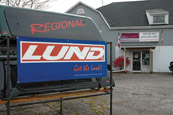 |
| Regional Auto Glass is an automotive windshield repair and replacement shop that specializes in high performance aftermarket accessories. |
Today about 30 percent of the company’s annual revenue is derived from automotive windshield replacement work while 40 percent comes from commercial and specialty glass work with the rest coming from rust control and aftermarket accessories for pickup trucks.
Day is optimistic that there is more growth yet to attain in this industry but in what direction he is not sure. It depends on what industry trends he identifies or new products he spots which will inevitable find a place in his operation. “I don’t know what changes the future will bring, but we will diversify and adapt to them,” he says. “Come back in a week and see what’s for sale out front.” -end-
Print this page